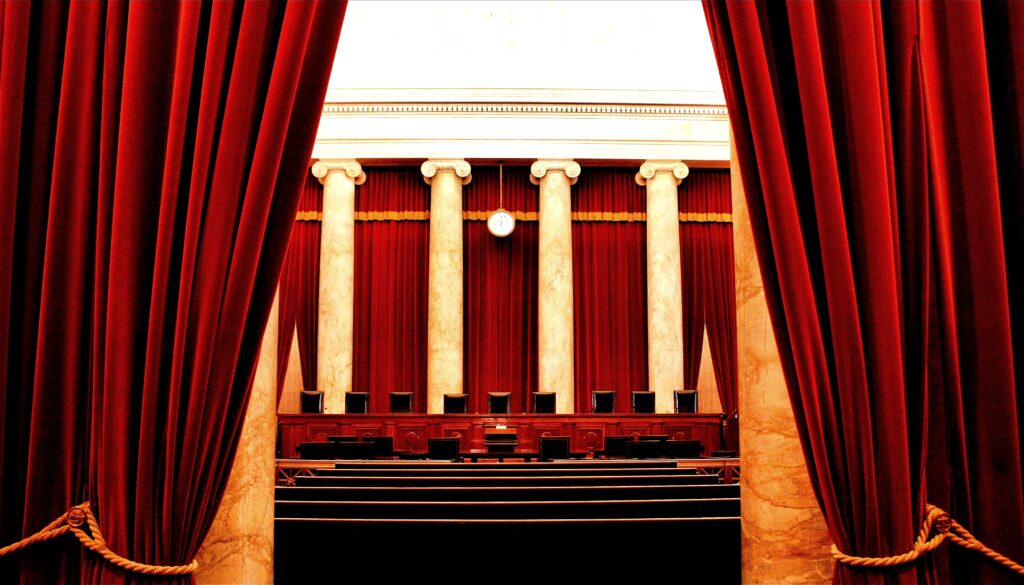- News
Judicial Watch 2024: Admin Power and Establishment Clause Cases
A pair of recent SCOTUS rulings could reshape agency rulemaking and enforcement powers, and a case out of Oklahoma could be the next front in establishment clause questions.

Disclaimer: The following is provided to further education and research and is not intended to provide legal advice or counsel as to any particular situation. The National Association of Bond Lawyers takes no responsibility for the completeness or accuracy of this material. You are encouraged to conduct independent research of original sources of authority. If you discover any errors or omissions, please direct those and any other comments to NABL.
By: Brian Egan, Director of Government Affairs, NABL
The Supreme Court released two cases this term that may curtail administrative power, and a recent ruling from a state court could tee up yet another Establishment Clause case for a future Supreme Court. While neither Supreme Court case directly impacts the municipal market, both are seen as rollbacks of executive branch power and could influence rulemaking and enforcement activities of agencies tasked with regulating markets.
Examining Administrative Law Judges
SEC v. Jarkesy examined the U.S. Securities and Exchange Commission’s (SEC’s) use of administrative law judges (ALJs). Federal agencies, including the SEC, have used in-house courts for some time to handle administrative law disputes. In an earlier case, the 5th Circuit Court of Appeals held that Congress erred and violated multiple sections of the Constitution in delegating agencies, in this case the SEC, with the power to adjudicate disputes through executive branch courts that are separate from the judiciary system. The finding prompted the SEC to appeal to the Supreme Court, which has now partially affirmed the lower court’s ruling.
Specifically, the majority ruled this term that the seventh amendment of the Constitution guarantees defendants in administrative law securities fraud cases the right to a jury trial. While the majority opinion was more limited than some had expected, it is nonetheless a blow to federal agency enforcement power.
Reexamining Chevron Deference
In the 1984 landmark case, Chevron v. Natural Resources Defense Council (NRDC), the Supreme Court held that courts must defer to federal agency interpretations of their congressionally granted authority when statute was ambiguous and so long as the interpretation was reasonable. For more than four decades, that precedent of “Chevron Deference” has shaped the collective understanding of administrative power and shaped the outcomes of numerous court cases challenging agency rulemaking actions.
Two consolidated cases questioning that precedent landed before the Supreme Court this term. Loper Bright Enterprises v. Raimondo and Relentless, Inc. v. Department of Commerce question the National Marine Fisheries Service’s (NMFS’s) interpretation of power delegated to the agency by Congress. Specifically, the plaintiffs challenged the NMFS’ rules requiring subjected fishers to pay $700 per day to underwrite the cost of federal supervisors.
In its majority opinion this morning, the Court overturned the 40-year precedent of deference toward agency interpretation. The opinion authored by Chief Justice Roberts finds that the “Administrative Procedure Act requires courts to exercise their independent judgment in deciding whether an agency has acted within its statutory authority, and courts may not defer to an agency interpretation of the law simply because a statute is ambiguous.” Roberts goes on to clarify that Courts should pay respect to agency interpretation, but it is ultimately the Courts who must determine what the law is. The opinion asserts that “Chevron’s presumption is misguided because agencies have no special competence in resolving statutory ambiguities. Courts do.”
It goes on, however, to clarify that today’s opinion does not “call into question prior cases that relied on the Chevron framework. The holdings of those cases that specific agency actions are lawful— including the Clean Air Act holding of Chevron itself— are still subject to statutory stare decisis despite our change in interpretive methodology.” It remains unclear to what extent this ruling could limit regulatory oversight, but many observers note the loss of Chevron deference as major a blow to federal agency rulemaking powers.
Additional Establishment Clause Cases Coming Down the Pike
On June 25, the Oklahoma Supreme Court ruled against the state virtual charter school board’s decision to approve an application from a parochial school. The charter would entitle St. Isidore of Seville Virtual Charter School access to taxpayer-provided public funding. In its decision, the state’s top court determined the board violated both federal and state religious liberties protections, including those provided by the Establishment Clause of the U.S. Constitution. Proponents of the school’s charter have previously indicated that they intend to take the challenge all the way to the U.S. Supreme Court if needed. Advocates are likely encouraged by the conservative leaning court’s makeup and recent rulings in cases that have similarly questioned public funding access for religious institutions.
In 2017, the Court ruled in Trinity Lutheran v. Comer that denying public funding for a secular program due to the applicant’s status as a religious institution violated the Free Exercise Clause of the Constitution. Two additional recent rulings have further expanded public funding opportunities for religiously affiliated educational institutions. In Espinoza v. Montana Department of Revenue (2020),the court explored a state program that conferred tax benefits to donors of scholarship funds, provided that none of the scholarships be awarded to cover tuition at religious schools. And, in Carson v. Makin (2022), the Court examined a policy of a state’s tuition assistance program that required benefiting institutions to be “nonsectarian.” The Court found that both policies violated the Free Exercise Clause of the Constitution.
The Oklahoma case could rise to the Supreme Court in the future and pose yet another question relating to the availability of public funds to religious institutions.
Member Renewals Underway
Membership renewals for 2025 are due February 7, 2025. Log into your NABL account to renew today and secure your member benefits for the upcoming year or email nabl@nabl.org for assistance.
Not a member? Join now for 2025 and receive the rest of 2024 free!
